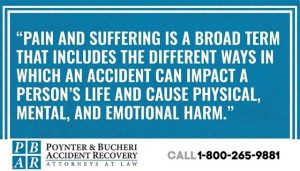
How to Ask for Pain and Suffering

If you suffered from an accident, you may now face any number of injuries that impact different aspects of your life, such as your social life, mental and emotional health, and your ability to enjoy activities.
Fortunately, you can file a claim or lawsuit against the party responsible for your accident, and you can seek damages that compensate you for your pain and suffering. Of course, no amount of money can truly compensate you for the physical, mental, and emotional discomfort you’ve experienced due to your accident, but pain and suffering damages can help you financially as you heal.
To recover these damages, you’ll need to gather evidence and present your claim to the at-fault party’s insurance company. If you’re wondering how to ask an insurance company for pain and suffering damages, the truth is it’s best to have a personal injury attorney handle all communication on your behalf.
Although you’re not legally required to go through a personal injury lawyer to help you with your claim, an experienced attorney can greatly increase the likelihood that you recover pain and suffering damages as they have many years of experience negotiating these claims and expertly presenting evidence. In this blog, we’ll discuss pain and suffering damages and why you should have a personal injury attorney negotiate for these damages on your behalf.
What is Pain and Suffering?
Pain and suffering is a broad term that includes the different ways in which an accident can impact a person’s life and cause physical, mental, and emotional harm. These damages are considered non-economic because they’re not associated with a specific monetary amount. Medical bills, lost wages, and property damage, on the other hand, are all considered economic damages because they reimburse victims for their financial losses.
Many different forms of physical, mental, and emotional discomfort fall under the scope of pain and suffering including:

- Grief
- Loss of companionship
- Physical pain caused by the accident and your resulting injuries
- Loss of enjoyment of life and activities
- Depression
- Anxiety
- Emotional distress
- Post-traumatic stress disorder
- Difficulty sleeping
- Panic attacks
- Anger
It’s important to note that pain and suffering damages aren’t only for car accident cases. If you’ve suffered from any type of accident caused by another party’s negligence, such as slip and fall accidents, dog bites, pedestrian accidents, and more, you may be able to recover these damages.
How to Ask For Pain and Suffering Damages
If you simply ask the at-fault party’s insurance company for pain and suffering damages without substantial evidence, they will say “no,” especially if you don’t have an attorney representing you. Statistically, those who obtain legal representation are able to recover substantially more money in compensation than those who represent themselves. One of the main reasons that’s the case is because insurance companies know that the average person doesn’t have the expertise to negotiate a higher accident claim. The insurance company can find ways to undervalue your claim and deny you fair compensation, and without legal representation, you’ll have an incredibly challenging time proving your case if you file a lawsuit.
Additionally, without legal representation, it’s difficult to know how much money to request for pain and suffering damages. You don’t have the same knowledge about personal injuries and claims as an attorney, meaning you could say or do something that hurts your claim.
For example, if you communicate with the at-fault party’s insurance company and they ask you how you’re doing, a response as seemingly trivial as “I’m doing well” can be used against you. The insurance company can jump on that response and argue that you were not seriously injured by their client, all because you politely responded to their question.
What To Do If You’re Seeking Pain and Suffering Damages
Regardless of whether you enlist a personal injury attorney to help you with your case, you’ll need to provide ample evidence that you’ve suffered physical, emotional, or mental discomfort. Unfortunately, it’s far more challenging to prove pain and suffering than other damages, such as medical bills and lost wages.
You need to provide as much evidence as possible for your claim. Some forms of evidence you can use include:
- Photographic and video evidence: Photos and videos of your injuries at the time of the accident can provide invaluable evidence of your suffering. For example, if you fractured bones in your leg due to a slip and fall injury, graphic photos of your affliction can show that you likely experienced incredible pain.
- Accident witnesses: Witnesses to the accident can provide testimony regarding your physical and emotional state. If you cried out in pain during the accident, for example, witnesses can corroborate that you expressed suffering.
- Medical records and doctor’s statements: Medical records and a physician’s statement can provide evidence that you experienced incredible physical discomfort as a result of your injuries. Additionally, any prescribed painkillers, antidepressants, and anti-anxiety medication can show that you experienced physical and mental pain.
- Expert medical testimony: Medical experts can provide statements regarding the extent and severity of your injuries, the level of pain you likely experienced, and the expected long-term effects of your injuries.
- Psychological evaluations: Statements from a mental health professional can corroborate that you experienced mental and emotional pain and suffering as a result of your accident and injuries.
- Your testimony: You can provide official testimony regarding the discomfort you’ve experienced as a direct result of the accident. Additionally, you can keep a journal that tracks your physical, mental, and emotional suffering and can also log how the injury has impacted your enjoyment of life. For example, your journal could detail how your affliction has kept you from socializing or engaging in other activities.
- Statements from family, friends, and colleagues: The people in your life can provide solid evidence that you’ve suffered as a result of the accident. They can attest that the accident and your injuries have impacted your mental and emotional well-being.
When you work with an experienced personal injury attorney, they’ll help you gather evidence to prove your pain and suffering claim and will present the evidence effectively on your behalf.
Call an Indianapolis Personal Injury Attorney to Recover Pain and Suffering Damages
Because pain and suffering is much harder to prove than economic damages, you’ll need to do everything you can to build a solid claim. Fortunately, a personal injury attorney can assist you through the entire claims process and will greatly increase your likelihood of recovering the compensation you deserve for your discomfort.
Here at Poynter & Bucheri Accident Recovery Attorneys at Law, our Indianapolis car accident and personal injury attorneys have years of experience helping victims recover pain and suffering damages. If you’re interested in learning more about how we can help you with your case, call 1-800-265-9881, or you can schedule a free case review here.
